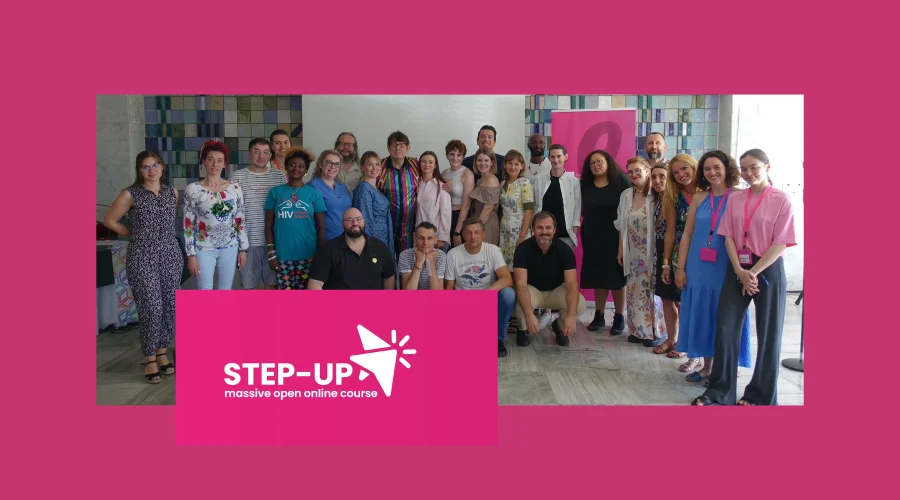From the 29th of June to the 2nd of July, the STEP-UP Community of Practice Workshop took place in Porto, Portugal. During the weekend, 22 HIV advocates attended a comprehensive programme to strengthen the knowledge and skills they need to advocate for the best HIV practices. This was also the occasion for them to share their experiences and connect on a personal level with activists from across Europe and Central Asia.
On the first day, participants were welcomed by the workshop’s facilitator, Julian Hows. The opening training explored the link between HIV and fundamental human rights, and demonstrated why advocating for them requires adopting an intersectional lens. A communal lunch was then followed by a case-study session on advocacy implementation, given by Christos Krasidis, which further equipped them to scale up their advocacy on a national and international level. This was the occasion for participants to learn about practical tools to create social mobilisation as well as a time to reflect on their personal journeys.
Being a person living with HIV, being a mother, being a social worker, are things without which my activism could not be the same
says Joanna (Portugal), a participant at the workshop, highlighting how intersectionality shaped their activism.
The second day was marked by a milestone of the project, as the STEP-UP mini grants were awarded to 8 MOOC graduates. Daria (Kyrgyz Republic), Hovsep (Armenia), Ivana (Croatia), Natalia (Kazakhstan), Nataliia (Ukraine), Paweł (Poland), Tatiana (Belarus), and Zoir (Tajikistan) presented their projects to the group outlining the steps they will take to implement them. Paweł explained that the grant would allow to extent their testing project in Poland far beyond their hopes and enable their organisation to reach many more people.
As an activist -and because it is so important- I would have pushed my project forward no matter what, but to have the means and the support to actually implement it makes a world of difference
explained Paweł.
The workshop resumed with training on programme management, budget advocacy and fundraising delivered by Olga Denisiuk and Sergii Dmytriiev. These sessions focused on providing participants with a concrete toolkit to lead their projects and influence funding streams. Reflecting on their experience Andrew (Iceland) shares that
with COVID my organisation lost a great part of its funding due to government cuttings. Since then, I dread talking about funding, but now I am excited to go back and share what I learned. It is great to find a spark where you had not expected it.
Importantly, the learning process continues outside the conference room, during moments of camaraderie over coffees and dinners. Beyond being a training, the weekend is a space for activists to connect with their peers and to take a step forward together. Andrea (Romania) summarises this sentiment by concluding that
my biggest take away from the weekend are the people who empowered me so much with their passion and the strength they have to advocate no matter their status.
Ricardo Fernandes, EATG Chair, closed the weekend with a hopeful call to action
This weekend has been an important place of learning for us who stand up for human rights and for our communities. I hope we can bring these learnings to our upcoming challenges because there is still so much to be done, and to be done together.
While the workshop is over, the STEP-UP MOOC continues to be accessible online in English and Russian for activists to deepen their knowledge of HIV advocacy and scale up their work. Find out how you can register and follow the STEP-UP MOOC here.

